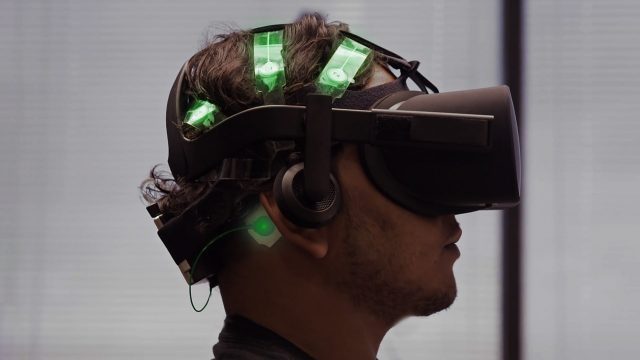

LISTEN TO THE VOICES OF VR PODCAST
Preston says that VR is challenging the long-standing enlightenment model of mind-body dualism, and that VR is able to do a sort of “redirected thinking” in being able completely control all aspects of someone’s else’s reality. This is a lot of power to put into the hands of performance-based marketing companies who have an extraordinary amount of data about our private lives; he has concerns that this data could start to be used to drive consumer behaviors in unconscious ways.
The technological roadmap for VR includes integrations with new biometric data streams including eye tracking, facial tracking, galvanic skin response, sensing of emotional states, our voices interactions, and perhaps even EEG brainwave data. This data has typically had tight privacy controls either within the context of medical applications or market research that requires explicit consent, but it’s being captured within the context of an attention-driven consumer market where there many other vectors of private data that have been collected and connected to your personal identity.
Here are some of open questions around the future of privacy in VR:
- Do we need to evolve the business models in order to sustain VR content creation in the long-term?
- If not then what are the tradeoffs of privacy in using the existing ad-based revenue streams that are based upon a system of privatized surveillance that we’ve consented to over time?
- Should biometric data be classified as medical information and protected under HIPPA protections?
- What is a conceptual framework for what data should be private and what should be public?
- What type of transparency and controls should users expect from companies?
- Should companies be getting explicit consent for the type of biometric data that they to capture, store, and tie back to our personal identities?
- If companies are able to diagnose medical conditions from these new biometric indicators, then what is their ethical responsibility of reporting this to users?
Preston has a nuanced view of what VR is going to enable in that he thinks that it’s not going to be either a total dystopian or utopian future, but that our future is going to be complicated and complex. Much like chess teams of humans & AI are able to beat any other AI program, this type of cooperation between humans and machines are going to enable all sorts of new amazing capabilities while also introducing new challenging problems.
The future integration of biometric data into immersive technologies will being an array of complicated and complex questions that go beyond what any single company or individual can figure out, but Preston says that this is something that the VR community as a collective should talk about and attempt to answer some of these open questions.
I’d like to keep this conversation going too; I’ll soon be featuring some more information from biometric experts from the Experiential Technology Conference on the Voices of VR Podcast as well as an interview with Oculus’ Nate Mitchell.
For my previous coverage on privacy in VR, be sure to not miss Sarah Downey’s take on privacy in VR and the relationship between the 1st and 4th Amendment, as well as Tobii Eye tracking’s recommendation for explicit consent for recording eye tracking data, HTC’s Dan O’Brien, and the following two interviews with Google with some open questions about Google Earth VR & Tilt Brush, as well as my interview with Linden Lab’s Ebbe Altberg.
Support Voices of VR
- Subscribe on iTunes
- Donate to the Voices of VR Podcast Patreon
Music: Fatality & Summer Trip

